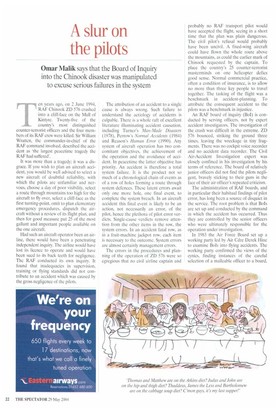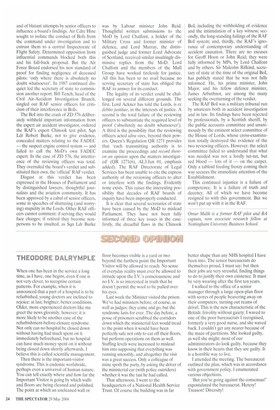A slur on
the pilots Omar Malik says that the Board of Inquiry into the Chinook disaster was manipulated to excuse serious failures in the system Ten years ago, on 2 June 1994, RAF Chinook ZD 576 crashed into a cliff-face on the Mull of Kintyre. Twenty-five of the country's most distinguished counter-terrorist officers and the four members of its RAF crew were killed. Sir William Wratten, the commander-in-chief of the RAF command involved, described the accident as the largest peacetime tragedy the RAF had suffered'.
It was more than a tragedy; it was a disgrace. If you wish to plan an aircraft accident, you would be well advised to select a new aircraft of doubtful reliability, with which the pilots are unfamiliar and nervous, choose a day of poor visibility, select a route through mountains too high for the aircraft to fly over, select a cliff-face as the first turning-point, omit to plan elementary emergency procedures, dispatch the aircraft without a review of its flight plan, and then for good measure put 25 of the most gallant and important people available on the one aircraft.
Had such an aircraft operator been an airline, there would have been a penetrating independent inquiry. The airline would have lost its licence to operate and would have been sued to its back teeth for negligence. The RAF conducted its own inquiry. It found that inadequacies in supervision, training or flying standards did not contribute to an accident which was caused by the gross negligence of the pilots. The attribution of an accident to a single cause is always wrong. Such failure to understand the aetiology of accidents is culpable. There is a whole raft of excellent literature illuminating accident causation, including Turner's Man-Made Disasters (1978), Perrow's Normal Accidents (1984) and Reason's Human Error (1990). Any system of aircraft operation has two concomitant objectives, the achievement of the operation and the avoidance of accident. In peacetime the latter objective has priority. An accident is therefore a total system failure. It is the product not so much of a chronological chain of events as of a row of holes forming a route through system defences. These latent errors await only one more hole, one final event, to complete the system breach. In an aircraft accident this final event is likely to be an action, not necessarily an error, of the pilot, hence the plethora of pilot error verdicts. Single-cause verdicts remove attention from the other items in the row, the system errors. In an accident fatal row, as in a fruit-machine jackpot row, each item is necessary to the outcome. System errors are almost certainly management errors.
The errors in the procedures and planning of the operation of ZD 576 were so egregious that no civil airline captain and probably no RAF transport pilot would have accepted the flight, seeing in a short time that the plan was plain dangerous. The civil pilot's refusal would probably have been uncivil. A fixed-wing aircraft could have flown the whole route above the mountains, as could the earlier mark of Chinook requested by the captain. To place the country's 25 counter-terrorist masterminds on one helicopter defies good sense. Normal commercial practice, often a condition of insurance, is to allow no more than three key people to travel together. The tasking of the flight was a benchmark in accident-planning. To attribute the consequent accident to the pilots was a benchmark in injustice.
An RAF board of inquiry (Bo!) is conducted by serving officers, not by expert accident investigators. The investigation of the crash was difficult in the extreme. ZD 576 bounced, striking the ground three times, leaving the wreckage in tiny fragments. There was no cockpit voice recorder and no accident data recorder. The Civil Air-Accident Investigation expert was closely confined in his investigation by his terms of reference. The board of relatively junior officers did not find the pilots negligent, bravely sticking to their guns in the face of their air officer's repeated criticism.
The administration of RAF boards, and in particular their habitual findings of pilot error, has long been a source of disquiet in the service. The root problem is that BoIs are set up and conducted by the command in which the accident has occurred. Thus they are controlled by the senior officers who were ultimately responsible for the operation under investigation.
In 1983 the Air Force Board set up a working party led by Air Cdre Derek Hine to examine Bois into flying accidents. The working party confirmed the views of the cynics, finding instances of the careful selection of a malleable officer to a board, and of blatant attempts by senior officers to influence a board's findings. Air Cdre Hine sought to isolate the conduct of Bois from the command under investigation and to entrust them to a central Inspectorate of Flight Safety. Determined opposition from influential commands blocked both this and his fall-back proposal. But the Air Force Board endorsed his new standard of proof for finding negligence of deceased pilots: 'only where there is absolutely no doubt whatsoever'. In 1987 continued disquiet led the secretary of state to commission another report. Bill Tench, head of the Civil Air-Accident Investigation Branch, singled out RAF senior officers for criticism of their interference in Bois.
The Bol into the crash of ZD 576 deliberately withheld important information from the expert air accident investigator, ordered the RAF's expert Chinook test pilot, Sqn Ldr Robert Burke, not to give evidence, concealed matters relating to the FADEC — the suspect engine control system — and failed to call the MoD's own FADEC expert. In the case of ZD 576, the interference of the reviewing officers was total. They overruled the board's verdict and substituted their own, the 'official' RAF verdict.
Disgust at this verdict has been expressed in the Houses of Parliament and by distinguished lawyers, thoughtful journalists and the aviation community. It has been approved by a cabal of senior officers, some in speeches of shattering (and worrying) stupidity in the Lords. Other RAF officers cannot comment: if serving they would face charges; if retired they become nonpersons to be insulted. as Sqn Ldr Burke was by Labour minister John Reid. Thoughtful written submissions to the MoD by Lord Chalfont, a holder of the Military Cross and former minister of defence, and Lord Murray, the distinguished judge and former Lord Advocate of Scotland, received similar insultingly dismissive replies from the MoD. Lord Chalfont and the members of the Mull Group have worked tirelessly for justice. All this has been to no avail because no serving secretary of state has obliged the RAF to answer for its conduct.
The legality of its verdict could be challenged on several different grounds. The first, Lord Ackner has told the Lords, is ex debit° justitiae, in the interests of justice. A second is the total failure of the reviewing officers to substantiate the required level of proof (absolutely no doubt whatsoever'). A third is the possibility that the reviewing officers acted ultra vires, beyond their powers. Queen's Regulation OR 1271 provides that 'each transmitting authority is to examine the proceedings and record thereon an opinion upon the matters investigated' (OR 1271(6), AL3/Jun 01, emphasis added). The RAF Directorate of Legal Services has been unable to cite the express authority of the reviewing officers to alter or interfere with the findings. Evidently none exists. This raises the interesting possibility that decades of RAF boards of inquiry have been improperly conducted.
It is clear that several secretaries of state have been caused by the MoD to mislead Parliament. They have not been fully informed of three key issues in the case: firstly, the dreadful flaws in the Chinook Bo!, including the withholding of evidence and the intimidation of a key witness; secondly, the long-standing failings of the RAF BoI system; and, thirdly, the RAF's ignorance of contemporary understanding of accident causation. There are no excuses for Geoff Hoon or John Reid; they were fully informed by MPs, by Lord Chalfont and by others. Sir Malcolm Rifkind, secretary of state at the time of the original BoI, has publicly stated that he was not fully informed. He, his prime minister, John Major, and his fellow defence minister, James Arbuthnot, are among the many seeking the overturning of the verdict.
The RAF BoI was a military tribunal run by amateurs both in accident investigation and in law. Its findings have been rejected by professionals, by a Scottish sheriff, by the public accounts committee and unanimously by the eminent select committee of the House of Lords, whose cross-examination totally destroyed the evidence of the two reviewing officers. However, the select committee failed to understand that what was needed was not a lordly tut-tut, but red blood — lots of it — on the carpet. Only a tabloid feeding frenzy coming their way secures the immediate attention of the Establishment.
This continued injustice is a failure of competence. It is a failure of truth and decency. All of which we have become resigned to with this government. But we won't put up with it in the RAF.
Omar Malik is a former RAF pilot and BA captain, now associate research fellow at Nottingham University Business School.



































































 Previous page
Previous page